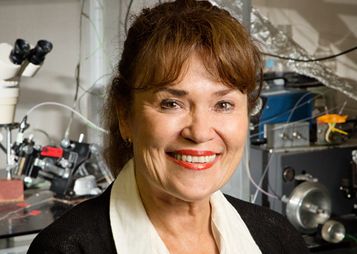Martha U. Gillette
 Professor Gillette is a neuroscientist who explores the substrates of complex behaviors in the context of biological timing. Her research has revealed that biological clocks, whose cellular processes mark the passage of time in near 24-hr cycles, are fundamental components of life, organizing our body functions around the major variable in the natural world, the daily cycle of darkness and light. She works at multiple levels to understand the actions of molecules in nerve cells and signal processing in the brain, and their consequences for what animals do. Her discoveries have important health applications: malfunctioning of the master circadian timing system results in brain and organ dysfunctions, which manifest as clinical disorders of sleep, affect and neural degeneration.
Professor Gillette is a neuroscientist who explores the substrates of complex behaviors in the context of biological timing. Her research has revealed that biological clocks, whose cellular processes mark the passage of time in near 24-hr cycles, are fundamental components of life, organizing our body functions around the major variable in the natural world, the daily cycle of darkness and light. She works at multiple levels to understand the actions of molecules in nerve cells and signal processing in the brain, and their consequences for what animals do. Her discoveries have important health applications: malfunctioning of the master circadian timing system results in brain and organ dysfunctions, which manifest as clinical disorders of sleep, affect and neural degeneration.
The research that she and her students have been conducting on the master circadian clock of the brain generates answers to the following questions:
- How does a ~24-hour clockwork emerge from biological parts?
- How does the master brain clock synchronize us to the ever-changing natural world?
- How does this brain clock orchestrate timing of brain processes?
In addition, she is engaged in cross-disciplinary research bridging campus excellence in cellular neuroscience, nanoscale analytical chemistry and materials engineering. She and her collaborators share the goal of discovering novel insights, solutions and applications for neural repair and restoration of function through targeting critical molecules and processes that construct micro-networks during the normal wiring of the nervous system. Through this bridge between biology and engineering, she is part of an NSF Science & Technology Center: Emergent Behaviors of Integrated Cellular Systems (EBICS), which has as a goal building machines out of cells. In addition, she is the Principal Investigator of an NSF-NRT program, Understanding the Brain: Training the Next Generation of Researchers in Engineering and Deciphering of Miniature Brain Machinery, which also bridges biology and engineering.
She has mentored > 50 graduate and postdoctoral trainees, the majority of whom are women, and received the Outstanding Advisor Award for her training of medical scholars. She has served in numerous advisory capacities to the National Institutes of Health and in executive positions at the Sleep Research Society, National Sleep Foundation, and Society for Research on Biological Rhythms. Gillette represents biology/neuroscience on the Alan T. Waterman Award Committee of the Director of the National Science Foundation. Gillette is a Fellow of the American Association for the Advancement of Science; recipient of the 2004 Women in Neuroscience Lifetime Achievement Award from the Society for Neuroscience; Director of the University of Illinois’ Neuroscience Program and faculty at the Beckman Institute for Advanced Science and Technology where she co-leads the Neurotechnology of Memory & Cognition Working Group in the Intelligent Systems theme. She is a Professor in the Departments of Cell and Developmental Biology, Molecular and Integrative Physiology, Bioengineering, and the Neuroscience Program. She is an affiliate of the Institute for Genomic Biology, Micro and Nanotechnology Lab and Center for Nanoscale Science and Technology. In addition, Professor Gillette is a Beckman Scholar, Center for Advanced Study Fellow, University Scholar, and a Cell and Developmental Biology Alumni Professor of the University of Illinois.
